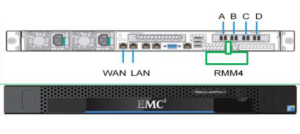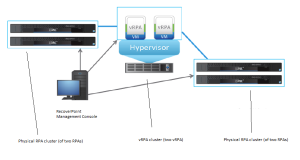EMC RecoverPoint – Architecture
RecoverPoint architecture consists of components such as RecoverPoint software, Appliance, write splitters etc. In this post I would like to give you a quick introduction to those components. To understand how RecoverPoint actually works first you have to understand all the small building-blocks of the RecoverPoint System.
RecoverPoint Appliance (RPA)
EMC RecoverPoint is appliance-based – which makes this solution highly scalable. RPA can be a physical appliance (RPA) or a virtualized RPA (vRPA).
RecoverPoint RPAs manage aspects of data protection and replication.
vRPA
The virtual RPA is a purely software-based instance of the RPA appliance, and utilizes services on an existing ESX platform – vRPA requires no other hardware compontents beyond the ESX server cluster it is deployed on.
RPA
RPA (RecoverPoint Appliance) has dedicated Fibre Channel, WAN and LAN interfaces.
- Fibre Channel is used for data exchange with local host applications and storage subsystems
- WAN is used to transfer data to other RPAs
- Management is used to manage the RecoverPoint System.
Array Based Write Splitter
RecoverPoint Write Splitter is used to split (duplicate) the writes. A write is sent first to the RecoverPoint appliance and then a duplicate is sent to the primary storage volume. It is important to understand that Write Splitter is Array-Based. It means that you don’t have to actually connect RecoverPoint Appliance between host and a Storage Array – instead a host is communicating with Storage Array directly, not even our of a RecoverPoint instance. Write Splitter is already built-in to the EMC VNX, VMAX, VPLEX storage systems.
RecoverPoint Cluster
A cluster of two or more active RPAs is deployed at each RecoverPoint Site. This provides high-availability – if one one RPA in a cluster fails, RecoverPoint immediately switches over to remaining RPA(s) in the cluster. RecoverPoint Clustes is a logical entity – a group of 2 to 8 physical (or virtual) RPAs that work together to replicate and protect data. Important fact: the number of RPAs in an RPA cluster must be the same at all RPA clustes in a RecoverPoint System. What is RecoverPoint System? Keep reading ?
RecoverPoint System
A RecoverPoint System is a logically single entity which replicates and protects data between all sites in one RecoverPoint installation. You can manage all RPAs through a floating cluster Management IP address. A system is a set up to 5* interconnected RecoverPoint Clustes managed via a single RP management console. (*5 clusters for RecoverPoint/EX and RecoverPoint/CL licenses, RecoverPoint/SE supports up to 2 clusters).
The number of RPA clustes included in a RecoverPoint systems usually depends on how RecoverPoint is used (local protection only/ local and remote protection / remote protection only).

